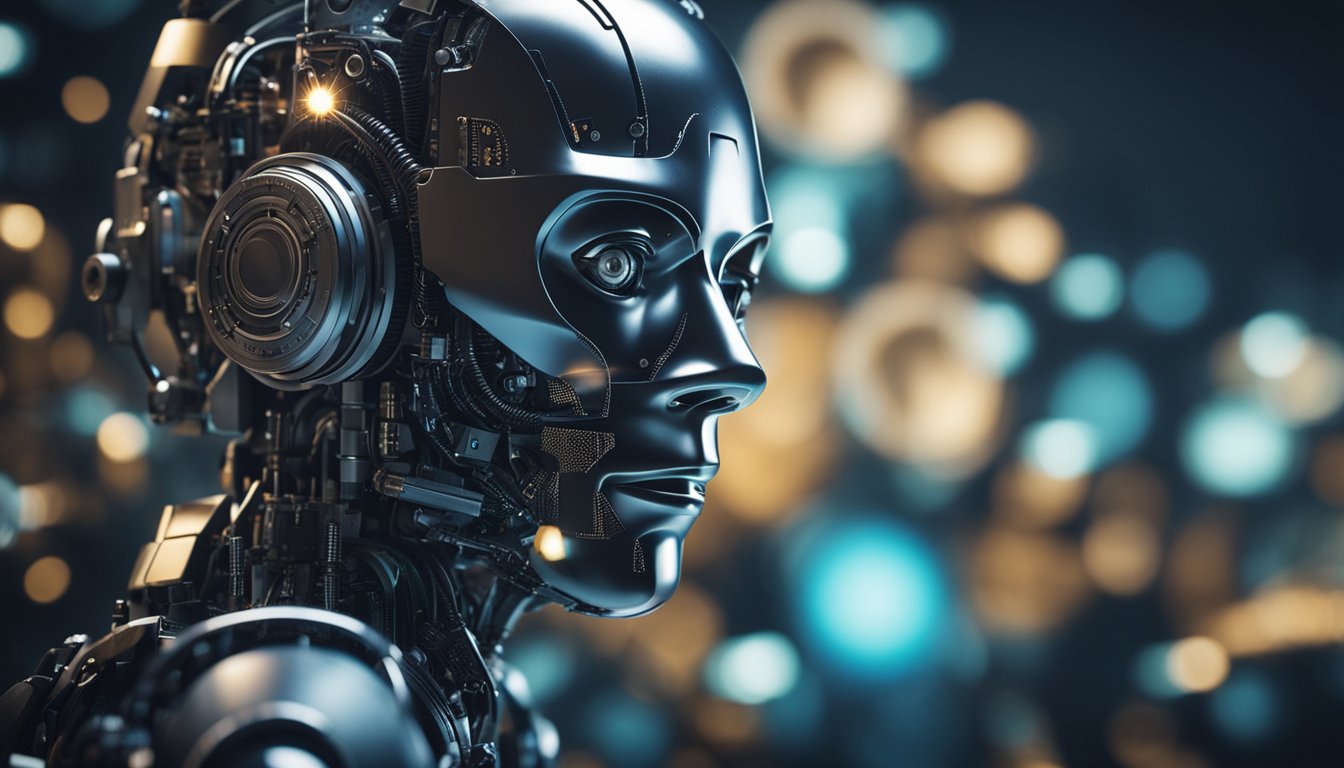
Role of AI in Custom Software Development
AI has been making waves in the tech industry for years, and its impact on custom software development cannot be overstated. The integration of AI in software development has brought about a revolutionary shift in how enterprises and tech startups ha
AI has been making waves in the tech industry for years, and its impact on custom software development cannot be overstated. The integration of AI in software development has brought about a revolutionary shift in how enterprises and tech startups harness innovative solutions to automate tasks that have traditionally relied on human intelligence. With AI, software development has become more efficient and cost-effective, saving businesses time and money.

The role of AI in custom software development is significant, and it has already begun to transform how we create applications and the larger business technology ecosystems. AI has the potential to enhance efficiency by automating tedious and repetitive tasks such as code reviews, testing, and debugging, minimizing the time developers spend on these tasks while simultaneously allowing them to focus on more complex issues. Additionally, AI can provide several benefits to business owners looking to thrive in the digital age, such as improving safety features, detecting unauthorized entry, and uncovering possible security flaws and attacks.
Key Takeaways
- AI has revolutionized custom software development by automating tasks, making software development more efficient and cost-effective.
- AI can enhance efficiency by automating tedious and repetitive tasks, allowing developers to focus on more complex issues.
- AI can provide several benefits to business owners, such as improving safety features and detecting security flaws and attacks.
The Impact of AI on Software Development

As a software developer, I have seen firsthand the impact of artificial intelligence (AI) on the industry. AI has revolutionized the way we approach software development, from improving efficiency and productivity to enabling innovation through automation and code generation.
Improving Efficiency and Productivity
AI has the potential to significantly improve efficiency and productivity in software development. One way this is achieved is through automating tedious and repetitive tasks, such as code reviews, testing, and debugging. This minimizes the time developers spend on these tasks while simultaneously allowing them to focus on more complex and creative work.
Another way AI improves efficiency is through predictive analytics. By analyzing data from past projects, AI can identify potential issues and provide recommendations for how to avoid them. This allows developers to proactively address problems before they arise, saving time and resources in the long run.
Innovation through Automation and Code Generation
AI also enables innovation through automation and code generation. Traditional software development often started with designers creating static mockups or wireframes of how an application should look. With AI, software development has evolved into "platform thinking." Instead of static designs, we create dynamic platforms that adapt to user behavior.
AI also allows for the automatic generation of code. This means developers can focus on high-level tasks such as designing and implementing algorithms, while AI takes care of the more mundane and repetitive coding tasks. This frees up time for developers to work on more creative and innovative aspects of the software.
In conclusion, AI has had a significant impact on software development. From improving efficiency and productivity to enabling innovation through automation and code generation, AI has transformed the way we approach software development. As a software developer, I am excited to see what the future holds for AI in this field.
AI in Design and User Experience

As a custom software developer, I have seen how AI has transformed the way we approach design and user experience. AI has enabled us to enhance our design processes and personalize user experience in ways that were previously impossible. In this section, I will discuss how AI is changing the landscape of design and user experience.
Enhancing Design Processes
AI has revolutionized the way we approach design, making it more efficient, accurate, and effective. AI-powered tools can analyze vast amounts of data, identify patterns, and generate insights that can inform the design process. For example, AI can be used to analyze user behavior and preferences, enabling designers to create more targeted and personalized experiences. AI can also help designers to identify and address usability issues, ensuring that the final product is both functional and user-friendly.
Another way that AI is enhancing design processes is through the use of generative design. Generative design is a process that involves using algorithms to generate multiple design options based on a set of parameters. This approach allows designers to explore a wide range of design possibilities quickly and efficiently, enabling them to find the optimal solution for a given problem.
Personalizing User Experience
Personalization is becoming increasingly important in the world of user experience. Users expect experiences that are tailored to their needs and preferences, and AI is making it easier to deliver on those expectations. AI-powered systems can analyze user data, such as browsing history and search queries, to create personalized experiences that are relevant and engaging.
One area where AI is having a significant impact on user experience is in the field of interaction design. AI-powered chatbots and virtual assistants are becoming increasingly common, enabling users to interact with software in a more natural and intuitive way. These systems can understand natural language and respond in a way that feels human-like, making the user experience more engaging and satisfying.
In conclusion, AI is transforming the way we approach design and user experience. By enhancing design processes and personalizing user experience, AI is enabling us to create software that is more efficient, effective, and engaging. As a custom software developer, I am excited to see how AI will continue to shape the future of design and user experience.
AI in Testing and Debugging

As a custom software developer, I have seen how AI has revolutionized the testing and debugging processes. AI has brought significant improvements to quality assurance, code quality, and development time. In this section, I will discuss how AI has transformed testing and debugging, and what benefits it brings to custom software development.
Revolutionizing Testing Processes
AI has transformed software testing by automating mundane tasks and solving complex problems. Manual testing no longer requires hours and resources. AI can detect defects, automate testing, and augment test strategies. With AI, developers can test software more thoroughly and identify bugs faster, resulting in a more efficient and effective testing process.
One of the most significant benefits of AI in testing is that it can help developers identify issues before they become problems. AI can analyze large amounts of data, identify patterns, and predict potential issues. This proactive approach allows developers to address problems before they occur, reducing the risk of costly errors and downtime.
Debugging with AI
Debugging is a critical part of the software development process. AI can help developers identify and fix bugs more quickly and efficiently. AI can analyze code and identify potential issues, reducing the time and effort required for manual debugging.
AI can also help developers prioritize which issues to address first. By analyzing code and identifying the most critical issues, developers can focus on fixing the most significant problems first, resulting in a more efficient debugging process.
In addition to identifying issues, AI can also suggest solutions. By analyzing code and identifying potential solutions, AI can help developers fix bugs faster and more accurately.
Overall, AI has transformed the testing and debugging processes in custom software development. By automating mundane tasks, identifying issues before they become problems, and suggesting solutions, AI has significantly improved the quality assurance, code quality, and development time.
Future of AI in Custom Software Development

As AI technology continues to advance, it is poised to have a significant impact on the field of custom software development. In this section, I will discuss two key areas where AI is already playing a role in custom software development.
Predictive Analytics and Machine Learning
One of the most significant ways AI is changing custom software development is through the use of predictive analytics and machine learning. By analyzing vast amounts of data, AI algorithms can identify patterns and insights that humans might miss. This analysis can help developers make better decisions and avoid errors, ultimately resulting in more efficient and accurate software development.
Machine learning algorithms can also be used to optimize software performance. For example, by analyzing user behavior, an AI algorithm can identify which features are most commonly used and prioritize those features in future development. This approach can help ensure that software development efforts are focused on the features that will have the most significant impact on users.
AI-Powered Tools and Personalized Recommendations
Another area where AI is having a significant impact on custom software development is through the use of AI-powered tools and personalized recommendations. These tools can help developers streamline their workflows, automate repetitive tasks, and identify potential issues before they become problems.
For example, AI-powered code completion tools can help developers write code more quickly and accurately by suggesting code snippets and auto-completing common code patterns. These tools can also help identify potential bugs in code before it is deployed, saving developers time and effort in the debugging process.
Personalized recommendations are another area where AI is making a significant impact on custom software development. By analyzing user behavior and preferences, AI algorithms can suggest features and functionality that are tailored to each user's unique needs. This approach can help ensure that software is more user-friendly and engaging, ultimately leading to better user adoption and retention.
In conclusion, AI is already playing a significant role in custom software development, and this trend is only expected to continue in the coming years. By leveraging the power of predictive analytics, machine learning, and AI-powered tools, developers can create more efficient, accurate, and user-friendly software that meets the needs of their customers.
Frequently Asked Questions

What is the impact of AI on software development?
AI has had a game-changing impact on software development. It has enhanced the way we develop apps and has allowed us to automate tedious and repetitive tasks, such as code reviews, testing, and debugging. This has minimized the time developers spend on these tasks while simultaneously allowing them to focus on more meaningful and innovative work. Overall, this can lead to faster development cycles and better quality software.
How can AI be integrated into custom software development?
AI can be integrated into custom software development by using machine learning algorithms to analyze large amounts of data and identify patterns. This can help developers to make more informed decisions and create more accurate and efficient software. Additionally, AI can be used to automate routine tasks, such as code generation and testing, which can save developers time and improve the quality of the final product.
What are the benefits of using AI in software development?
The benefits of using AI in software development are numerous. AI can help developers to automate routine tasks, such as code generation and testing, which can save time and improve the quality of the final product. Additionally, AI can help to identify patterns in large amounts of data, which can help developers to make more informed decisions and create more accurate and efficient software. Overall, using AI in software development can lead to faster development cycles and better quality software.
What are the challenges of implementing AI in custom software development?
There are several challenges associated with implementing AI in custom software development. One of the biggest challenges is the need for specialized skills and expertise. AI engineers need to have a deep understanding of machine learning algorithms and data analysis techniques. Additionally, there is a need for large amounts of high-quality data to train AI models, which can be difficult to obtain in certain industries.
How can AI improve the efficiency of software development?
AI can improve the efficiency of software development by automating routine tasks, such as code generation and testing. This can save developers time and allow them to focus on more meaningful and innovative work. Additionally, AI can help to identify patterns in large amounts of data, which can help developers to make more informed decisions and create more accurate and efficient software. Overall, using AI in software development can lead to faster development cycles and better quality software.
What skills are required for AI engineers to develop custom software?
AI engineers need to have a deep understanding of machine learning algorithms and data analysis techniques. Additionally, they need to be proficient in programming languages such as Python, R, and Java. They should also have experience working with large datasets and be familiar with data visualization tools such as Tableau and Power BI. Finally, they should have good communication skills and be able to work effectively in a team environment.




